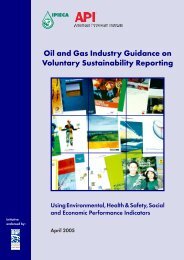Integrating Biodiversity Conservation into Oil and Gas ... - EBI
Integrating Biodiversity Conservation into Oil and Gas ... - EBI
Integrating Biodiversity Conservation into Oil and Gas ... - EBI
You also want an ePaper? Increase the reach of your titles
YUMPU automatically turns print PDFs into web optimized ePapers that Google loves.
from private financial institutions <strong>and</strong> multilateral<br />
development banks (MDBs) that are increasingly<br />
emphasizing good environmental performance in their<br />
screening practices <strong>and</strong> conditionalities for lending (see<br />
Box 7). A number of MDBs <strong>and</strong> other public financial<br />
institutions, including the World Bank, the International<br />
Finance Corporation (IFC) <strong>and</strong> the Overseas Private<br />
Investment Corporation (OPIC), have safeguard<br />
policies, guidelines <strong>and</strong> compliance requirements<br />
on environmental <strong>and</strong> social issues, several of which<br />
relate to biodiversity conservation. (See: World Bank<br />
Safeguard Polices at http://lnweb18.worldbank.org/<br />
ESSD/essdext.nsf/52ByDocName/SafeguardPolicies;<br />
IFC Environmental <strong>and</strong> Social Safeguard Policies at http:<br />
//www.ifc.org/enviro/EnvSoc/Safeguard/safeguard.htm;<br />
<strong>and</strong> OPIC Environmental H<strong>and</strong>book, Appendix F, at<br />
www.opic.gov) Loss of public financing may force a<br />
company to seek more expensive private financing.<br />
In addition, with the growing popularity of socially<br />
responsible investment (SRI), companies with good<br />
environmental performance records may have an<br />
advantage. SRI portfolios typically exclude corporate<br />
securities in investment portfolios if a company’s<br />
average of past years’ environmental <strong>and</strong> social records<br />
do not meet pre-determined st<strong>and</strong>ards. <strong>Biodiversity</strong> is<br />
beginning to be an explicit component of the evaluation<br />
criteria for SRI. The Ethical Investment Research Service<br />
(EIRIS) has developed a set of biodiversity criteria, in<br />
consultation with English Nature <strong>and</strong> the Earthwatch<br />
Institute, that focuses on policy <strong>and</strong> management<br />
systems. Companies’ biodiversity policies are graded<br />
as good, moderate or basic, based on whether there is<br />
a group-wide biodiversity policy or strategy covering<br />
all relevant operations or sites, whether site-based<br />
<strong>Biodiversity</strong> Action Plans are implemented <strong>and</strong><br />
contribute to local or national conservation objectives,<br />
<strong>and</strong> whether conservation or wildlife groups are involved<br />
in the drafting of the biodiversity policy or action plans.<br />
In its 2001 survey, Business in the Environment, an<br />
organization that publishes an annual Index of Corporate<br />
Environmental Engagement, included questions<br />
on management of biodiversity issues for the first<br />
time. Questions included assessments of companies’<br />
measurement <strong>and</strong> reporting on biodiversity issues,<br />
quality <strong>and</strong> scope of information used to measure<br />
performance, targets <strong>and</strong> policies regarding impact on<br />
biodiversity <strong>and</strong> recent improvements in performance<br />
on biodiversity issues.<br />
Besides SRI funds, some mainstream investment<br />
companies are beginning to adopt policies <strong>and</strong> guidelines<br />
on biodiversity. Insight Investment, a British investment<br />
manager with more than £64 billion (US$111.2 billion)<br />
in assets under management launched an Investor<br />
Responsibility Service in late 2002. <strong>Biodiversity</strong> is<br />
one of several initiatives under that program, with an<br />
objective of encouraging companies to “minimize impact<br />
on biodiversity <strong>and</strong> support implementation of the<br />
Convention on Biological Diversity.”<br />
2.3.3 Access to human <strong>and</strong> intellectual capital<br />
Among a company’s most valuable assets are its<br />
employees <strong>and</strong> the intellectual capital built <strong>into</strong> a<br />
business. Leadership companies have long had a<br />
recognized advantage in attracting, retaining <strong>and</strong><br />
motivating top talent. As more young people are<br />
becoming aware of environmental issues, a company’s<br />
track record on treatment of biodiversity may be one<br />
factor influencing the perceptions, decisions <strong>and</strong><br />
motivations of new recruits.<br />
2.4 A NEED FOR FURTHER STUDY<br />
Increasingly, companies are recognizing that there are<br />
moral <strong>and</strong> ethical, as well as financial <strong>and</strong> economic<br />
reasons for including biodiversity considerations in<br />
decision-making as part of the company’s broader<br />
approach to environmental <strong>and</strong> social performance. Yet,<br />
while it is recognized that there are both tangible <strong>and</strong><br />
intangible benefits to being a responsible operator <strong>and</strong><br />
a company that cares about biodiversity, there is very<br />
little documented evidence of how these values translate<br />
<strong>into</strong> benefits to a company’s bottom line. There is thus<br />
a real need for companies, conservation organizations<br />
<strong>and</strong> other interested parties to document <strong>and</strong> share<br />
information to quantify <strong>and</strong> demonstrate the specific<br />
business values of integrating biodiversity conservation<br />
<strong>into</strong> company policies <strong>and</strong> management systems.<br />
20 The Energy & <strong>Biodiversity</strong> Initiative



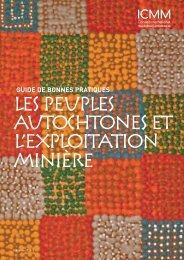
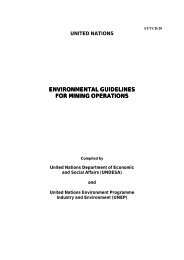

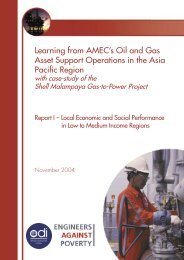
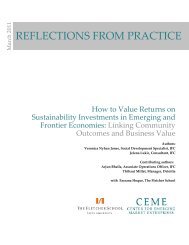
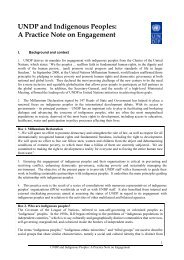
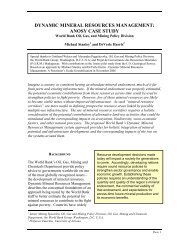
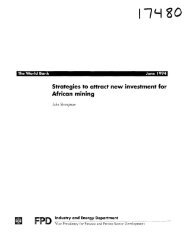

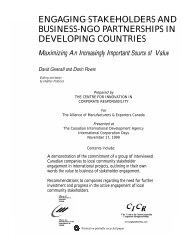
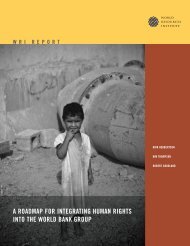
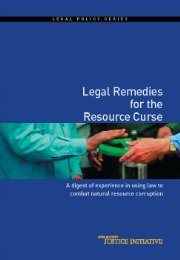
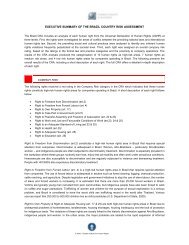
![[PDF] Community Development Toolkit - CommDev](https://img.yumpu.com/48616495/1/184x260/pdf-community-development-toolkit-commdev.jpg?quality=85)
